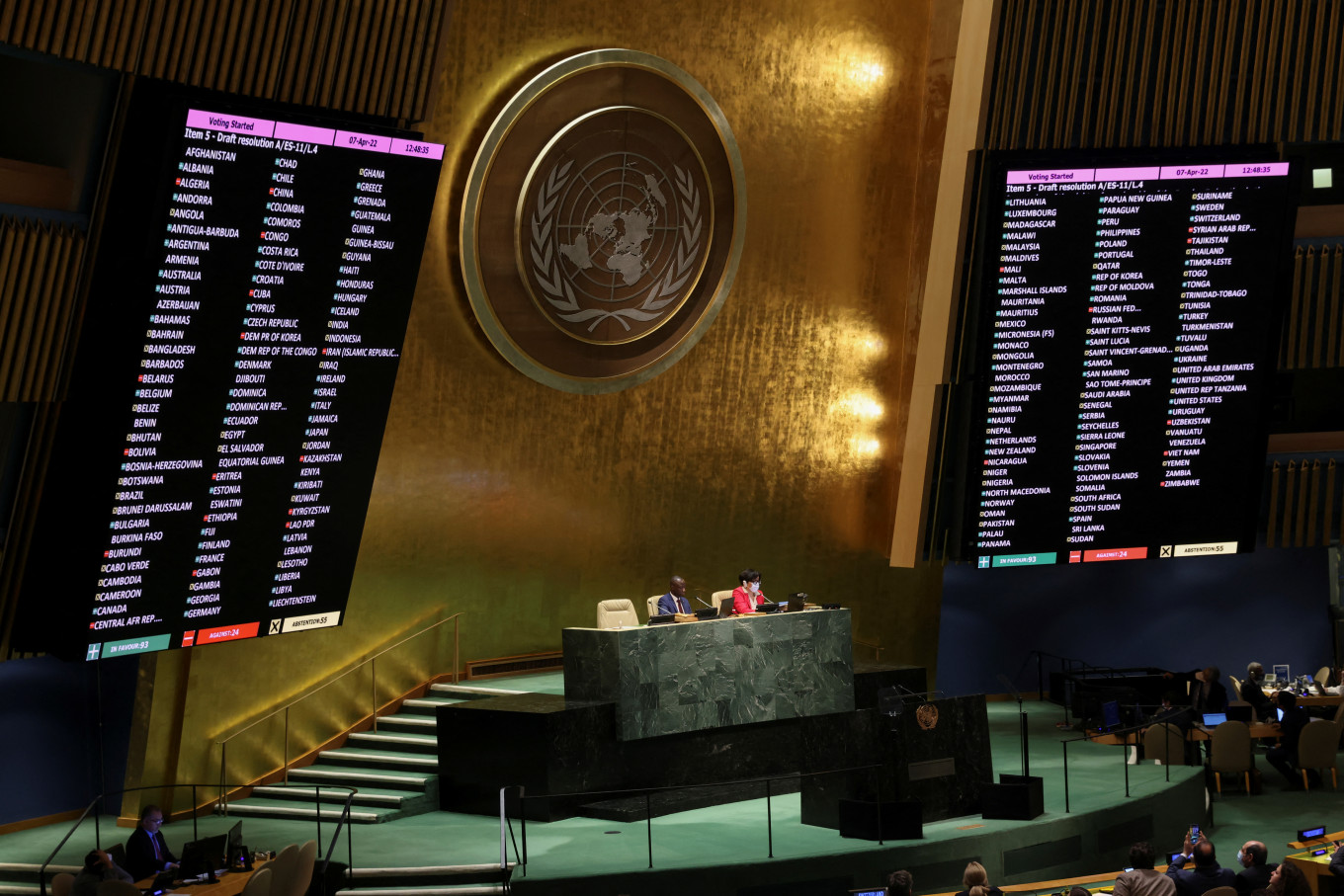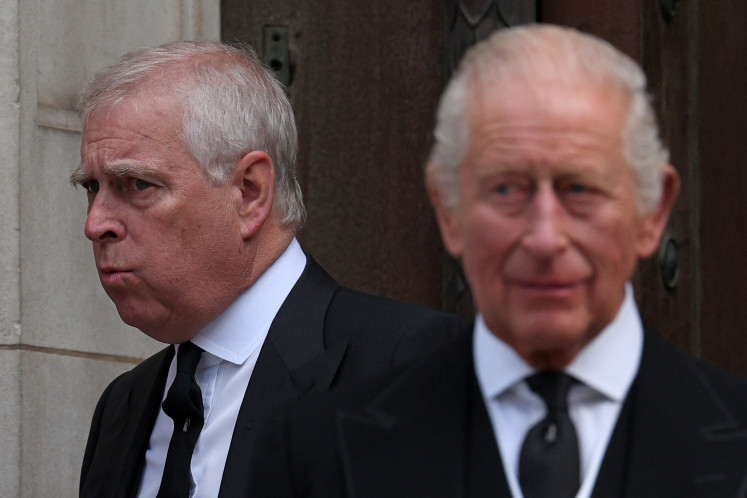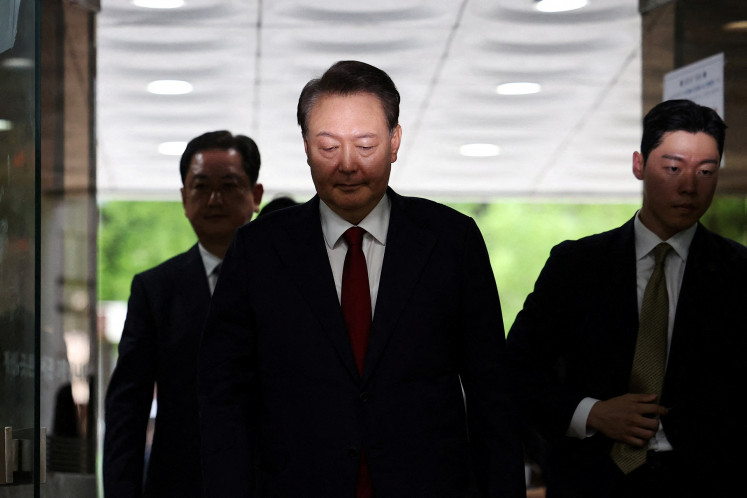Popular Reads
Top Results
Can't find what you're looking for?
View all search resultsPopular Reads
Top Results
Can't find what you're looking for?
View all search resultsIndonesia draws line on Russian annexation
Indonesia voted in favor of a United Nations General Assembly (UNGA) resolution on Wednesday condemning Russia’s annexation of four Ukrainian territories, in a departure from its previously noncommittal stance on the war.
Change text size
Gift Premium Articles
to Anyone
 Displays show the list of countries taking part in voting on suspending Russia from the United Nations Human Rights Council during an emergency session of the UN General Assembly at the UN headquarters in New York City, the United States. At the time, Indonesia chose to abstain from the vote, but Jakarta voted in favor of a more recent UNGA resolution on Oct. 12 condemning Russia's annexation of Ukrainian territories. (Reuters/Andrew Kelly)
Displays show the list of countries taking part in voting on suspending Russia from the United Nations Human Rights Council during an emergency session of the UN General Assembly at the UN headquarters in New York City, the United States. At the time, Indonesia chose to abstain from the vote, but Jakarta voted in favor of a more recent UNGA resolution on Oct. 12 condemning Russia's annexation of Ukrainian territories. (Reuters/Andrew Kelly)
I
ndonesia, seeking to “uphold its national principles of respect for national integrity”, voted in favor of a United Nations General Assembly (UNGA) resolution on Wednesday condemning Russia’s annexation of four Ukrainian territories, in a departure from its previously noncommittal stance on the war.
The resolution, which 143 countries supported and 35 abstained from, “condemns the organization by the Russian Federation of so-called referendums within the internationally recognized borders of Ukraine” and Moscow’s “attempted illegal annexation”.
Russia, Belarus, North Korea, Nicaragua and Syria voted against the resolution, while China, India, Laos, Vietnam and Thailand were among the countries that abstained from the vote.
Speaking to reporters on Wednesday, Foreign Ministry spokesperson Teuku Faizasyah claimed Indonesia’s position on the matter was “very clear”.
“Our decision [...] stems from a principle we uphold, which is the respect for territorial integrity. What happened [in Ukraine] directly opposed Indonesian principles,” he said.
Indonesia’s UN delegation in New York had decided that backing the motion would be most aligned with its foreign policy principles, said Dian Triansyah Djani, special advisor to the foreign minister.
“Our positions at the United Nations – or any other international forum for that matter – are based on international humanitarian law. That is the basis of all of our actions,” claimed the senior diplomat.
“As a country, we have been consistent in our stance that international law must be held in the highest regard. Whether that is in the case of Kosovo, Crimea, Ukraine or any other case, our actions on multilateralism are based on international law, the rules of the game.”
The former ambassador to the UN said Indonesia made decisions on international resolutions “on a case-by-case basis”, alluding to a previous UN resolution in April that Jakarta chose to abstain from which sought to kick Russia out of the UN Human Rights Council (UNHRC) following its invasion of Ukraine. The measure was passed by the UNGA with 93 countries voting in favor.
At the time, Indonesian Ambassador to the UN Arrmanatha Nasir said that while Jakarta shared the same “deep concerns” over the humanitarian crisis in Ukraine, it had chosen to abstain from the resolution because of worries that the exclusion of Russia would disrupt the objectivity of ongoing independent investigations of human rights abuses in Ukraine.
The latest vote demonstrated a “sharp turn” in Jakarta’s position on the war in Ukraine, said Riza Noer Arfani, an international relations expert from Gadjah Mada University (UGM).
Read also: More G20 deadlock signals dire November summit
“The vote in favor of the resolution is an affirmation that we are neutral. It is also aligned with our perspectives on international law,” Riza told The Jakarta Post on Thursday.
“If we look at the [annexation] process, it is in fact not in line with the principles of international law. The places annexed by Russia were not claimed legally. [...] The organization to initiate such political referendums was not legitimate.”
Jakarta’s decision to take a definitive stance on the issue was a step in the right direction, said Riza, adding that the country should seek to use its role as G20 president this year to formulate a joint communiqué that promoted a peaceful solution to the crisis.
But the conflict has split the global consensus on many important issues, including at the G20.
“We need to keep emphasizing that this war should not be continued, that all countries should practice restraint instead of escalating the war. We can see that NATO and the West are similarly responsible for escalating conflict, which needs to be advised against,” Riza said.
‘Immediately and unconditionally’
After the vote, Ukrainian President Volodymyr Zelensky wrote on Twitter that he was “grateful to [the] 143 states that supported [the] historic UNGA resolution”, and that “[Russia’s] attempt at annexation [was] worthless”.
Meanwhile, Russian Ambassador to the UN Vasily Nebenzia said the resolution was “politicized and openly provocative”, as well as counterproductive to “any and all efforts in favor of a diplomatic solution”, AP reported.
In late September, Russian state media outlet Tass claimed that 99.23 percent of voters had chosen to “reunify” with Russia in a so-called referendum held by the Donetsk People’s Republic Central Election Commission. The supposed poll had asked residents of the four annexed areas in the southern and eastern parts of Ukraine whether they approved the territory’s incorporation into Russia, in many instances involving “armed officials going door-to-door collecting votes”, according to AP reporting.
Before the results of the vote were announced, the UN had already established its position that no referendum backed by Moscow in Ukraine could be “a genuine expression of popular will” or legal under international law.
Meanwhile, Moscow escalated its threat of using nuclear weapons to “defend its territory”, including the four newly annexed regions, and mobilized approximately a quarter of a million additional troops for deployment in Ukraine.
Beyond the condemnation, the UNGA resolution called for all its signatories, including international agencies, not to recognize any changes announced by Moscow to the borders in contention. It also called on Russia to “immediately and unconditionally reverse its decisions” with regard to the annexations.









